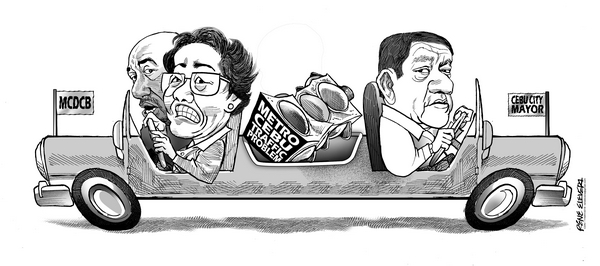
There’s at least one positive thing that came out of last Wednesday’s Metro Cebu traffic summit sponsored by the Metro Cebu Development and Coordination Board (MCDCB) also known by its moniker Mega Cebu.
Cebu City Mayor Tomas Osmeña said unless he found it “good”, he won’t abide with the traffic summit’s output since he doesn’t recognize the board’s authority over the city and other local governments.
The mayor’s adamant refusal to join the summit or any other programs sponsored by the MCDCB stems rightly or wrongly from his perception that the board doesn’t have the legal authority to dictate policies on local governments in Cebu on how it deals with problems common to all of them such as traffic.
He may have a point and it doesn’t help that his congressional ally, Rep. Raul del Mar of Cebu City’s north district sponsored a bill that wouild create an entity similar to the Metro Manila Development Authority. Such an entity would facilitate dialogues aimed at finding a common, unified solution to problems besetting the cities and towns under its coverage.
Speaking of common, the most prevalent or common problem facing the MMDA had been how to manage the egos, rivalries and parochical mindsets of mayors and governors when it comes to discussing solutions to their common problems.
On this point, it has to be specified clearly just how binding legal or otherwise these proposals for resolving Metro Cebu’s traffic problems are. To their credit, the board through its subcommittee on traffic management, said it would give Mayor Osmeña a copy of the summit’s output and proposed solutions to the traffic problem.
“Hopefully whatever traffic laws Cebu City will enact will align with the (summit’s output),” said Lynn Gloria Madrona, vice chairperson of the subcommittee. This has to be the most practical approach so far when dealing with the Cebu City mayor, who wants to do things his own way.
Though Mandaue City Mayor Luigi Quisumbing is more willing to listen and Mandaue City is considered the heart of Metro Cebu’s traffic since all commuters, motorists and commercial traffic pass through its roads, Cebu City remains an integral part of a unified traffic law system for Metro Cebu since most workers from the countryside have jobs there.
Dialogue remains a key element in finding solutions for Metro Cebu’s problems like traffic and garbage and this approach should be emphasized rather than having to impose any proposed solutions on local governments whose officials sadly remain distrustful and uncooperative owing to their need to protect their political turf so to speak.

